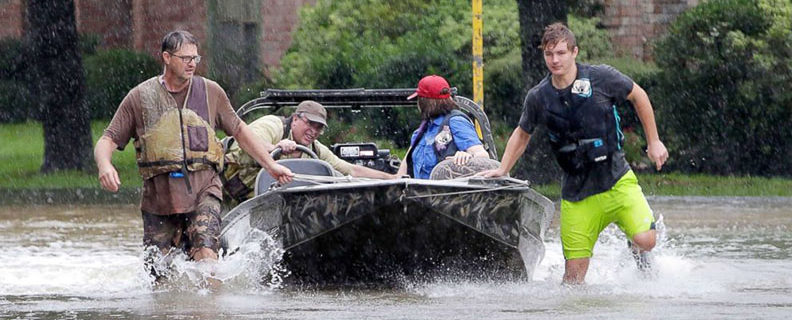Don’t Tell People How to Give
It took me a few days to explain the patterns of rescue, giving and recovery observed recently with the devastations brought about by Harvey. Stories in social media and news reporting abounded with individuals pitching in from the get-go.
The rescues began almost within minutes. The nation watched video of the Cajun Navy, boat owners and monster trucks manned by ordinary citizens navigating streets to rescue stranded victims loaded into private boats, packed into oversized trucks and carried on the backs of countless spur of the moment volunteers.
Mattress Mack opened his exquisite furniture showroom to families needing immediate shelter. The video of kids and stunned adults amidst pristine furniture displays that would not, could not, ever be sold as new – was stunning and amazingly inspirational.
HEB mobilized its distribution network to work around the clock to move water, food, cleaning supplies and necessary items overcoming all obstacles along the way. They emptied their stores, then filling them as fast as they could. Their crews worked overtime to restock and man the registers. They airlifted truck drivers to relieve their spent and exhausted coworkers and worked to keep the supply funnel as full as humanly possible.
Buc-ees opened their newest Texas-sized store to relief workers, providing food, fuel and a place to rest. They just opened it up without terms, conditions or restrictions.
The first shelters saw long lines of volunteers unloading cases of water, food and donated clothing. Hundreds of volunteers accepted, sorted and distributed donated clothing that arrived right away and just kept coming until the shelters were so packed, new donations had to be turned away.
Local first responders were here also but in far fewer numbers than ordinary citizen and resident volunteers. Everyone worked side-by-side, making it happen without regard for who people were, where they were born, how toney their neighborhood, or how much money they earned.
After a few days, outside support organizations, FEMA and other government agencies started to arrive and it seemed that some of the edge came off all that outpouring of giving and support.
I wondered, why was that? Had compassion waned? Was there no more survivor’s guilt for those unaffected? No, but suddenly rules, regulations, requirements came into play.
It seems to me that when third parties start to dictate how others are to help, what they should give, or where the help ought to be directed – the willingness to donate, volunteer and help diminishes. When third parties start criticizing how others should help victims, attitudes change. When reporters show up at shelters and stick microphones in the face of traumatized victims asking them how they feel, motivation changes. When stories about how the Red Cross should not have put volunteers in a nicer hotel, charity lessens. When social media blasts churches for not opening their doors – charity takes a back seat.
Volunteers and donors don’t need be told how to give of their time, possessions and money by bystanders. We saw immediate rescue and relief made possible by volunteers who simply pitched-in to face each situation as they saw necessary. They did not need to be told how to do it, where to go or what to do. Left alone, they simply got the job done.
Nitpickers who want to criticize churches, companies, organizations or individuals about how they responded need to shut-up and pitch-in. If someone doesn’t like it that a church did not open its doors soon enough – don’t worship there. If they think a charity’s distribution ratio is inappropriate – don’t give them money. If they doubt funds won’t go directly to someone in need – find someone in need and hand them some cash, give them some clothes that will fit, offer them a guest room, or show up to help clean up the debris.
We were once a nation where charity was private and it worked. We had communities where people met their neighbors’ needs. Where help came more willingly from those who did not want or need to be told how, where or what to give.
We saw that in the flood waters, shelters and devastated neighborhoods of Southeast Texas. You could argue that’s just what makes Texas a great place to live, but I think not. It’s truly the heart of what it means to be the USA.






Leave a Reply